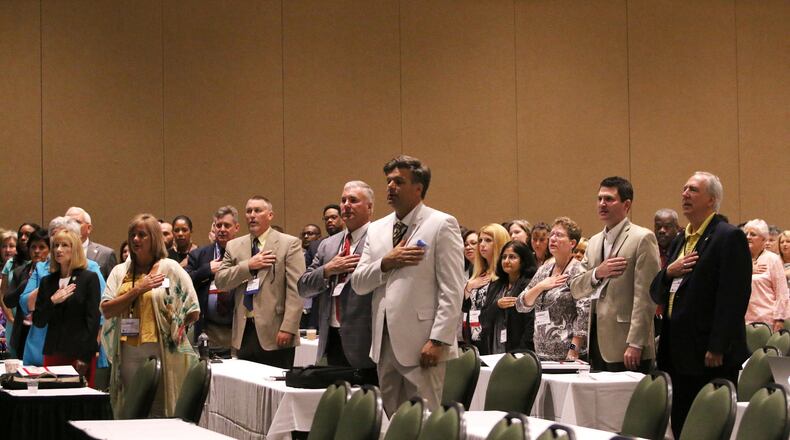An Atlanta Journal-Constitution/Georgia News Lab investigation that revealed the legal way in which county tax commissioners are profiting from taxpayer dollars — some by tens of thousands of dollars — has rekindled a debate over whether state lawmakers should regulate the practice.
“Clearly something is out of whack here,” said state Rep. Scot Turner, R-Holly Springs. “I am certain that a county tax commissioner should not be enriching themselves this way.”
County tax commissioners can contract with cities to collect their taxes and receive personal compensation. There is no limit on how much tax commissioners can charge the cities, resulting in fees that vary widely across the state. The AJC/News Lab investigation identified at least 48 tax commissioners who earn fees from cities to boost their county salaries.
Turner said legislation to regulate the system is past due, and the concern is bipartisan.
“I was just as surprised as many others that a tax commissioner has such a bonus,” said state Sen. Gloria Butler, D-Stone Mountain.
Though there have been no formal proposals to change the fee system yet, Speaker of the House David Ralston, R-Blue Ridge, is open to “considering a better way to do business,” according to a statement from his office.
Legislators hinted at the possibility of addressing regulations to the fee system on social media.
Reps. Ken Pullin, R- Zebulon, and Scott Holcomb, D-Atlanta, and Sen. Jen Jordan, D-Atlanta, posted about the AJC/News Lab investigation on social media, which garnered some surprised responses from followers.
Holcomb said he’s received negative feedback about the system from constituents and other legislators, and he predicts legislation will be proposed in the next session.
“I always think when you are an outlier, that’s something that needs to be very closely examined, especially in a public policy space,” said Holcomb, referring to how Georgia’s neighboring states do not allow tax commissioners to collect fees personally.
Meanwhile, the city of Atlanta is looking into its own legislation to cut down on the more than $220,000 being paid to Fulton County Tax Commissioner Arthur Ferdinand.
Atlanta District 9 Councilman Dustin Hillis said he intends to initiate a financial study to find out if the city could collect its own property taxes more cheaply than contracting with Ferdinand.
But this solution wouldn’t solve the whole problem, he said.
“Really, it’s incumbent upon our state legislators to make that change in state law,” Hillis said.
Lobbyists for localities weigh in
The Georgia Municipal Association, which lobbies for Georgia cities, does not have a policy position regarding the negotiations between cities and tax commissioners.
Cities look at these agreements like any other contracting service, said GMA’s spokeswoman Amy Henderson. If the cities benefit from contracting with the tax commissioner, they reach an agreement. If not, they do the taxes themselves.
The Georgia Association of Tax Officials, which has resisted previous attempts to stop tax commissioners from collecting fees, supports that position.
“We are merely complying with the law put forth and as always, are doing what’s best and most affordable for all entities,” Georgia Association of Tax Officials President Tabetha DuPriest said in a statement.
Clint Mueller, legislative director of the Association County Commissioners of Georgia, doesn’t know if the issue will make it in the ACCG 2020 legislative agenda, though the organization has tried to change the system in the past.
“On the scale of things of things (county commissioners) are dealing with, this is kind of a small issue,” Mueller said.
Rep. Mary Margaret Oliver, D-Decatur, said the conversation about tax commissioner fees has a long history under the Gold Dome.
“I never understood why tax commissioners had enough power to protect themselves from what looked like an abuse to me,” Oliver said.
When former Sandy Springs Rep. Wendell Willard was in office, changing this “loophole” became a priority, Oliver said.
Willard wanted to add transparency to the system by routing the fees the cities pay to the tax commissioners through the counties, but his 2007 legislation passed with serious limitations. Most counties were exempt because the regulation only applied to the largest counties in the state.
Willard had bipartisan support and said his fellow representatives, including Oliver, were just as “enraged” as he was.
The power tax commissioners wielded in the Legislature came from a reliable network rather than lobbying money, Willard said. The county tax commissioners can get their fellow local officials to go to their state representatives and ask them to vote against regulations.
But Willard had the backing of the ACCG in 2007, Mueller said. The group wanted each county to know what money the tax commissioner collected since the county paid for all the staff and overhead to provide the tax collection service.
ACCG also approached the GATO about capping the personal fees paid to tax commissioners using a sliding scale based on the size of the county, which Mueller said GATO thought was reasonable.
But nothing came of these talks, Mueller said, and ACCG has dropped this issue for the past several years.
Though he’s no longer in office, Willard said he hopes renewed public interest will help pressure the Legislature to adopt tougher regulations.
“I think the next step is getting some legislators who find this conduct objectionable and hope that they will work together as sponsors on a bill,” Willard said.
Keep Reading
The Latest
Featured



